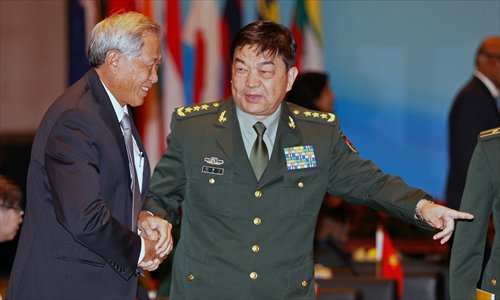China condemns meddling over ASEAN joint statement
US seeks to drive wedge between China and regional countries: expert

China's Defense Minister Chang Wanquan talks with Singapore's Defense Minister Ng Eng Hen after the Association of Southeast Asian Nations Defense Ministers' Meeting-Plus in Kuala Lumpur, Malaysia on Wednesday. Photo: AP
China on Wednesday expressed regret after defense ministers failed to agree on a joint statement at a Southeast Asian summit, reportedly due to disagreement between China and the US over wording related to the South China Sea.
Analysts believe that the US action is aimed at splitting the regional nations over political positions, a move that will risk further confrontation with China.
China's defense ministry said Wednesday that "some individual countries outside the region ignored the existing consensus and attempted to forcefully add into the declaration contents not discussed during the meeting."
The ministry said China has reached a consensus with Malaysia and other members of the Association of Southeast Asian Nations (ASEAN) on the content of the document but certain countries' behavior "totally deviated from the purposes and principles of the ASEAN Defense Ministers' Meeting-Plus, and damaged the central and dominating role of ASEAN in the mechanism."
The ministry said these individual countries should take full responsibility for the absence of the joint declaration.
According to a Reuters report, disagreement between the US and China over how to address the South China Sea issues led to a scrapped joint statement on Wednesday in Subang, Malaysia, after ministers failed to agree on its wording.
The US and its allies had pressed for a mention of disputes in the South China Sea in the statement, while China believed such reference should be dropped, Reuters reported.
US influence dwindling
"As a country outside the region, the US wanted to introduce the South China Sea into the joint statement because the US is fully aware that the topic touches on China's national interests," Jin Canrong, vice director of the School of International Studies at the Renmin University of China, told the Global Times Wednesday.
The US destroyer USS Lassen sailed within 12 nautical miles of Zhubi Reef on October 27, and a defense official said the mission, which lasted a few hours, passed by Meiji Reef, Reuters reported. China claims both reefs as part of its Nansha Islands.
The US Navy plans to conduct similar patrols about twice a quarter or "a little more than that" to "remind China and other countries about US rights under international law," a US defense official was quoted anonymously by Reuters as saying on Monday.
According to Jin, with cooperation deepening between China and ASEAN countries, the US influence over the region is dwindling. For this reason it tries to contain China by playing up the dispute in the South China Sea.
"By allying with countries like the Philippines in the region, the US, as well as Japan, tries to drive a wedge between China and ASEAN countries, aiming to break the countries into different interest groups and complicate the situation," Zha Xiaogang, a research fellow at the Shanghai Institute for International Studies, told the Global Times.
Risking confrontation
The meeting, which was first held in 2006 to build a platform to promote regional peace and stability, included defense ministers from the 10 ASEAN members and counterparts from countries such as Australia, China, India, Japan and the US.
"The cancellation of the joint statement also shows internal conflicts within the ASEAN," Han Feng, deputy director of the Institute of Asian-Pacific Studies of the Chinese Academy of Social Sciences, told the Global Times.
Zhao Gancheng, director of South Asia Studies at the Shanghai Institute for International Studies, said the US intends to create an impression that it is the US, not China, which holds the decisive power over the South China Sea.
Zhao believes that if the US continues to play up the issue, it risks further confrontation with China.
"It's selfish for the US and its allies to raise the stakes despite the region's security and prosperity. China should make its response through talks within ASEAN countries and reinforce its military influence in the South China Sea," Zha said.
Agencies contributed to this story